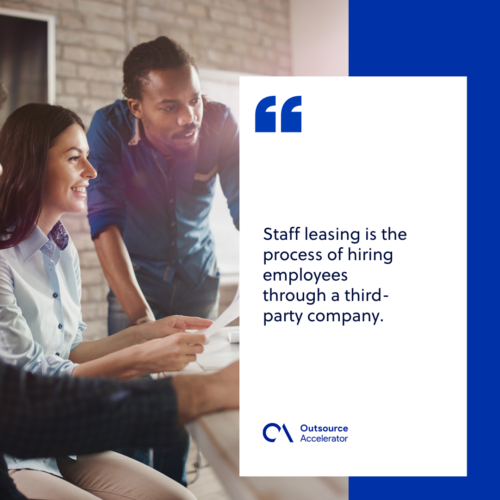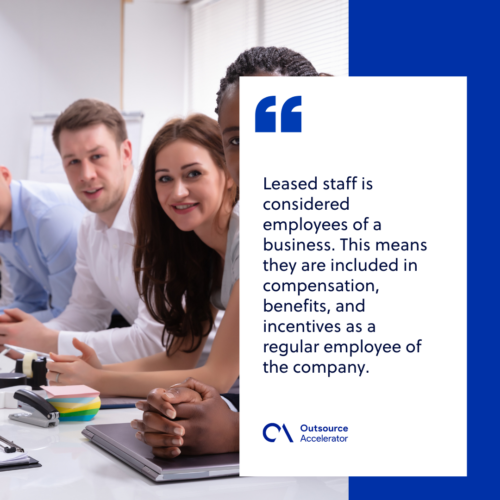Advantages and disadvantages of staff leasing for your business

Remote employment is becoming increasingly popular, but there might still be a time when small businesses need a team they can interact with physically. This is when staff leasing comes into play.
Businesses turn to employee leasing when they want to expand their team strategically. A third-party staff leasing provider can provide them with in-house administrative tasks on a fraction of direct employment.
These tasks include small jobs like maintaining the office space, coordinating with the courier to deliver their products, or safeguarding their place.
Staff leasing for your business
Staff leasing or employee leasing is the process of hiring employees through a third-party company.
This works the same as seat leasing, where the third-party shoulders the office space, complete with equipment and connection needed for their work.
They will only provide the manpower and cover the administrative duties for them.
The company and the business owner share employment responsibilities for the staff.
Their work duties will come from the employer, while the staff leasing company will take care of the workers’ compensation, salaries, benefits, and tax payments, all paid by the employer.
Employers decide to do staff leasing for a few reasons:
Ease the burden on administrative tasks
Hiring additional employees means additional paperwork required for compliance. It also means additional tasks, such as payroll management, are needed.
With staff leasing, the Professional Employer Organization (PEO) can handle the administrative services needed for staff employment, including tax payments and benefits applications.
Save on recruiting costs
Since PEOs do the recruitment for the business, the costs of hiring and onboarding an employee are now decreased.
It is also an advantage for their HR team since they can focus on core activities for the company.
Hire for maintenance and other services
To focus on the main tasks, employers lease staff to do maintenance work. Most PEOs provide blue-collar employees, usually janitors, lobby receptionists, and security guards.

Relationship with the company
Leased employees feel that they belong to the company. They can absorb their culture, work ethics, values, and morals.
They also have the chance to get to know other employees and bond with them through team-building activities and other social events.
Employer benefits
Staff leasing provides several employer benefits, such as the following:
- Access to local top talents – There’s no need for employers to have expertise in finding high-quality talents needed for their roles. The PEO or the leasing agency will do it for them.
- Expertise in compliance – PEOs are trained to coordinate with tax agencies and other offices and comply with the required paperwork needed for new staff. With this, employers can ensure that they will file these documents with minimal errors on their part.
- Legal protection – If an employee sues them for alleged discrimination or wrongful termination, a PEO can help them provide the legal requirements for the trial.
Disadvantages of staff leasing
Staff leasing has its disadvantages that all businesses must be aware of. Here are some drawbacks to consider:
Less control over employees
Though leased staff renders work for a business, they are still employed by a PEO or staffing agency.
Therefore, the company still has to communicate with their agency if they want to hire or fire certain staff.
Lack of direct communication
Employees won’t have direct communication with the company HR or authorities once they request or demand a salary increase or raise a concern in their workplace.
They would have to go to their staffing agency to raise their concerns properly. This goes the same with the company they render work to.
Increased dependency on staff leasing
Companies might also grow dependent on staff leasing, which could hurt their business.
In turn, work and product quality might be sacrificed, resulting in poor customer and employee satisfaction.
Lack of motivation and commitment
Lastly, leased staff are only committed to a company for a certain period.
This can demotivate them in planning long-term commitment with their employees and investing in their growth as a part of the company.
This also demotivates employees in return since they are aware of their definite time with the business.

What to consider when employee leasing
In order to avoid this, business owners must consider a few things before considering staff leasing:
Find the best staff leasing provider
The Internet is the easiest place to start when it comes to employee leasing agencies.
Review sites like Manta list different agencies, including their address, contact numbers, pricing, and ratings. Some even include reviews and rankings on their website.
A referral is also a good way to start researching. Ask a few friends and local businessmen who already tried staff leasing if they have a company to refer to.
Determine the need for staff leasing
Leased employees also work full-time, though they should be hired for the short term. If their work requires a long-term employee commitment, hiring an in-house employee or outsourcing it is better.
While staff leasing has several drawbacks, such as a lack of involvement in the employee hiring process, these can be avoided by partnering with an established and well-trusted staffing agency like Booth and Partners.
Consider outsourcing
Consider outsourcing processes that don’t need physical interaction. Outsourcing processes help to save big on costs and resources.
Hiring an offshore BPO company is also a good strategy when it comes to expanding a business.







 Independent
Independent




